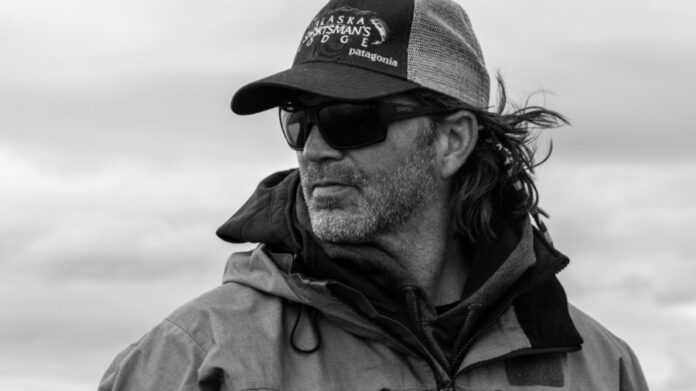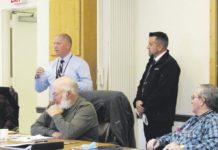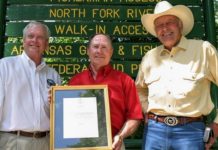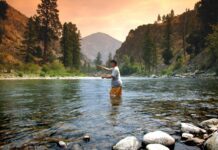Written by: Evan Jones
All photos courtesy of Brian Kraft, Alaska Sportman’s Lodge
Brian Kraft first arrived in Alaska in 1988 as a wide-eyed 21-year-old from Chicago, recruited by the University of Alaska to play division 1 hockey. “I wasn’t even a fisherman when I arrived,” he told me, “but it was so wide open that it called to me. About three weeks later, I told my mom I didn’t think I was ever coming home.”
Over the next three decades, Brian did indeed stay (mostly) in Alaska, eventually building a thriving fishing lodge from scratch on the banks of the Kvichak river. And when his livelihood became threatened by the now-notorious Pebble Mine project just upstream, Brian responded by helping to kick off one of the most successful grassroots conservation movements in Alaska history. While the details of this tireless effort could easily fill a novel, the highlights that follow make for an inspiring story on their own, and could also serve as a useful blueprint for other communities with a desire to safeguard their communities and way of life from an incompatible project.

During the summers in those early days, Brian supplemented his income in the off-season with a raft-rental business that he started after learning—to his surprise—that none yet existed in Anchorage. Word quickly spread through town, and within the first few weeks, he had already doubled the number of rafts due to constant sellout. Over the summers that followed, Brian hired some of his fellow hockey players as guides and began to expand his client base substantially, both locally and abroad. As his hockey career slowed down, Brian turned his focus on his rafting business full-time, eventually becoming better known for his skills with a paddle than with a puck.
So when the opportunity arose to lease a 160-acre property on the world-famous Kvichak River—a location he knew would appeal to his clients, given its status as a trophy rainbow fishery and home to some of the largest salmon runs in the world—Brian jumped to make his dream happen. Ultimately, he succeeded only because of the solid reputation he had built among so many local boating and angling enthusiasts (not to mention his hockey teammates and fans), some of whom had significant sway in these matters. This recipe for success through grassroots support would serve Brian well all throughout his upcoming battles.

When he first heard rumors about the plan for the Pebble Mine in 2004, Brian was excited by the prospect of more jobs and more opportunity for local people. But that initial enthusiasm soon faded when one of his lodge guests, a mining industry expert from Nevada, asked to fly over the proposed site to have a look. “No, no, too much water…that’s way too much water,” he kept saying, going on to explain that one of the biggest challenges for open pit mines is controlling the groundwater, which would be a seemingly insurmountable task in this marshy area riddled with interconnected lakes. This led Brian to look deeper at the plans for containing water at the site, and soon his growing concerns led him to attend a meeting of a well-known advocacy group in Anchorage, hoping to get them involved. And when they politely declined to take up the fight due to lack of resources, Brian made another key decision that would contribute greatly to the campaign’s ultimate success: he decided to start his own nonprofit–called the Bristol Bay Alliance.
The mission statement of the Bristol Bay Alliance was: The people that live and work in Bristol Bay should have the loudest voice as to what happens to their lands. This needed to be a grassroots, bottom-up decision. If the people of Bristol Bay were in favor of this project going through, then it would have happened. I felt it very important that they were heard, but I was confident that once the people became aware of the habitat destruction this type of mining does, that they would rally against it. —Brian Kraft
Despite his lack of any formal training in the non-profit sphere, Brian sought to educate as many people as he could about open-pit mining He filled the board of directors of the Bristol Bay Alliance with members from local communities, and enlisted the help of a local scientist named Scott Brennan, who had valuable expertise in these matters. Their vision was simple–that the people of Bristol Bay should have the loudest voice in deciding what happens to their lands–but achieving this goal was anything but simple. Brian and Scott set out to personally visit each village in the region in order to host a public seminar and neutral discussion on the topic of open-pit mining so that local voices would be better-informed. Getting to some of these remote locations during the winter required a combination of small charter planes, snow machines, and even dog sleds, but they persevered throughout the 2005/06 season, eventually reaching the majority of communities in the region. Turnout was nearly 100% for every event, yet not one person had ever laid eyes on an actual open pit mine before. So Bristol Bay Alliance decided to host several site visits to working mines down in Nevada, Montana, and Utah, and invited folks from each village to come down and see these operations for themselves. Unsurprisingly, support for the Pebble Mine among these communities dropped precipitously once they had the opportunity to see a massive industrial mine up close.
By late summer of 2006, Brian’s and the Bristol Bay Alliance’s work began to attract crucial support from new players who would propel the campaign even further. First, Trout Unlimited established an office in Alaska, and immediately jumped in with both feet after TU president Chris Wood visited the location with Brian. This was an uncharacteristic move from a bi-partisan group of conservation minded anglers that didn’t usually take an “absolutely no” position on issues. Brian worked closely with TU to launch their anti-Pebble Mine campaign. “Brian has been an incredible, unwavering advocate in this fight.” says Nelli Williams, Alaska Director for TU. “His early leadership, constant vigilance, and wholehearted dedication to safeguard the fishery helped turn the Pebble Mine–a massive threat to Bristol Bay that no one initially knew about–into a movement that millions of people have taken action to stop.”

Brian’s early work also attracted the attention of Bob Gilliam, the Alaska-born head of a major capital investment firm, and owner of a private lodge in the region. Bob wanted to help too and started his own organization–focused on getting the message out to fellow Alaskans. So he, along with Brian, Scott and a few other outdoor enthusiasts, founded the Renewable Resource Coalition, and spent millions of dollars broadcasting ads–some of which were downright incendiary–intended to raise public awareness and to force legislators to take a stand on this controversial issue. “We threw a lot of darts at the board,” he told me, reminiscing about those days. “We had a lot of ideas, never knew what was going to stick.”
Arguably the single most significant development in the movement’s success came two years later in 2008 when, at the urging of their shareholders, The Bristol Bay Native Corporation–a for-profit organization holding the rights to much of the land required to access the mine site–officially joined the fight against the project. This was a truly pivotal moment in the campaign. Thanks in part to Brian’s fierce determination and desire for this to be a locally driven effort, the people of Alaska had learned a thing or two about open-pit mining over the past few years, and the tide of public opinion had overwhelmingly and irrevocably turned against it.

The story doesn’t end there, of course, but by this point, the crucial groundwork had mostly been laid, and the roadmap to success clearly outlined. “The efforts of basically all companies in the industry brought national attention to the issue, which eventually brought the issue to our highest levels of government.” Brian explains. “The Obama, Trump, and Biden administrations have all been involved in Pebble, and each have played a role in getting it stopped. And to think we started from the very basics of a grassroots effort—I didn’t even know what an NGO or 501-C3 was until I started my own.”
Before joining Orvis, I spent a decade working for an environmental-justice NGO where I watched hundreds of similar campaigns come and go, and the handful that were actually successful all had these same elements in common. The Pebble Mine could be being built in Bristol Bay right now if not for the remarkable initial work of Brian, the other Alaskan leaders who quickly joined in, and the thousands of local people who loudly and determinedly spoke up to protect their home rivers for past two decades. Next time you’re tempted to believe that one person can’t make a difference, remember that Bristol Bay would likely be a very different place today if not for the collective actions of many dedicated individuals.
“It’s because of community leaders like Brian that Bristol Bay will remain fish-filled and wild…a place future generations can depend on to connect with their culture and to support their families.” —Nelli Williams, Trout Unlimited
Brian Kraft is owner and operator of Alaska Sportsman’s Lodge and Bristol Bay Fishing Lodge in Southwest AK.
Evan Jones is the assistant editor of the Orvis Fly Fishing blog.
Credit: Source link































